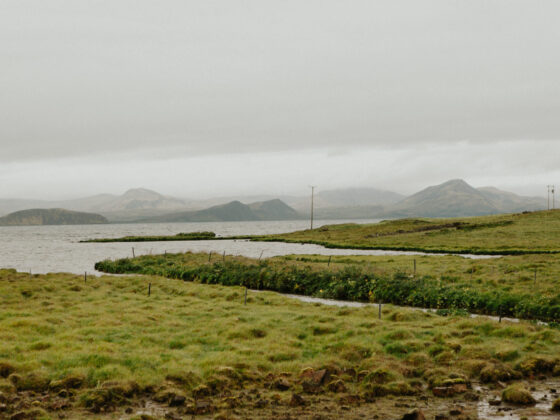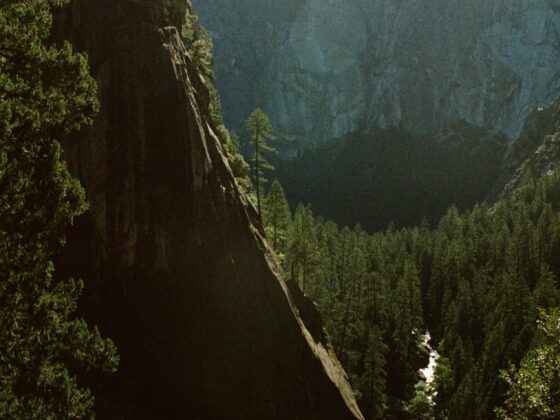I am a mountain girl at heart. If given the chance to take a mountain or beach vacation, I will choose the mountains every time. Not the least because my skin is too pale for the intense sun rays of the beach, or that my hair is too untamed for the humid, salty breeze. There is something about the mountains and their beautiful display of color in autumn and snow-covered trees in winter that draws me in. The views are unbeatable, the smells are pure, and the adventures are endless. Not only that, some of my earliest and most innocent memories are tied to the mountains.
I grew up in the suburbs of Cincinnati, but my family and I are originally from a small mountain town called Greenfield, Massachusetts. Tucked down between views is the house where I lived. A small, white, picture-perfect cape cod in a quaint neighborhood. My parents were still married, my siblings and I got along, and everything felt “normal.” Our normal quickly dissolved into a disheveled “new.” My parents separated, causing us to relocate to Ohio where their divorce would be finalized, ushering in the first valley of my young life.
The valleys ebbed and flowed with mountain top experiences, such as the start of a different family dynamic, academic and athletic success, new friendships, and, ultimately, my meeting Jesus at 12 years old. With the Lord, I have experienced spiritual highs but also spiritual lows. Valleys so dark and quiet, my mental dialogue sounded as though it was screaming. Valleys so long, I thought I would never see the base of a mountain. Valleys so hopeless, it seemed easier to be with Jesus than it did to wait on him.
All of us have experience with the mountains and valleys of life. Plans go sideways, relationships fail (as well as our bodies), jobs are lost, and we are left to pivot. As a believer, these things can affect our spiritual disciplines, particularly our time in Scripture. But if his Word is alive,1 we must stay closely attached to this lifeline in order to forge ahead. Like Jesus tells his disciples in John 15, he is the vine. We need not worry, or fear, but simply abide in him and his love and his Word.2
A particular portion of his Word that keeps me connected when I am in a valley is Psalm 23. I am reminded that the valleys, as well as the mountaintops and all the paths between the two, have a purpose. The purpose being that we would know and love God more, which will fuel our faithfulness and obedience to the things he calls us to. Through this well-known and beautiful Psalm, I believe we can learn three valuable lessons that will sustain us in the valleys we encounter:
The valley is not the only path
The valley is not the destination
The Shepherd is with us in the valley
The Valley is Not the Only Path
Psalm 23:1-3 reads,
The Lord is my shepherd; I shall not want.
He makes me lie down in green pastures.
He leads me beside still waters.
He restores my soul.
He leads me in paths of righteousness
for his name’s sake.
First thing to notice is how God is described as a shepherd. David, author of this Psalm and former shepherd himself, would have known the shepherd’s job was to care for and protect his sheep. The shepherd would not intentionally lead his sheep on paths he did not trust they could successfully travel. Our Shepherd is no different. God knows where he is taking us. He knows his intention for the journey and the outcome when we arrive. We can trust that God is in control and ordering our steps as we stay close behind.3
Second thing to notice are the different paths. A shepherd would lead his sheep to green pastures and beside still waters, two things that were not easily found in the land David was writing from. David lived in the desert. The most common terrain was dry and arid. In order to get to the green pastures and still waters, shepherds would have a great amount of clearing to do along the path. Plants would need to be uprooted, debris would need to be moved, and an opening would need to be cleared. How often does God do this in our own lives? For those of us who are in Jesus, the process of sanctification looks much like the shepherd clearing a path. God uproots false belief and lies. He removes doubt and uncertainty and paves a path for us to see his goodness. When all the debris of our heart is out of the way, we can enjoy him in the pasture.
At the end of verse two, David says, “He restores my soul.” The restoration of our souls is indicative of a return to life. God brings newness to the areas where we feel dead. When we are beat down and defeated by this broken world, God restores us in order to lead us on “the paths of righteousness for his name’s sake” (Psalm 23:3). We are not led on these paths to promote our own glory and success, but instead to point an unbelieving people to the only one who can save and restore their souls.
The Valley is Not the Destination
Psalm 23:4 reads,
“Even though I walk through the valley of the shadow of death…”
The place where shepherds kept their sheep was called a “fold.” The fold was an area of land surrounded by a stone wall to keep the sheep contained when not traveling. If the shepherd did not have his sheep in their fold, every other path along the way was just that, a path. It was not where they would ultimately remain, but instead served a purpose to find water and food, or perhaps relocate to a new fold.
Oftentimes, when we find ourselves in a valley, we are so deep in our feelings, we believe we have arrived at our final destination. David’s wording in this verse, however, points to the opposite. He states, “Even though I walk through the valley of the shadow of death…” The word through, according to the Oxford English dictionary, literally means “moving in one side and out on the other side; so as to continue in time toward the completion of a process, period, etc; continuing to the final destination.”4
Do you see that second definition? It reads, “to continue in time toward the completion of a process.” Friends, the valley is not a surprise to God, but perfectly orchestrated according to his timeline in order to complete a process within us. Maybe our valley season is to reveal and refine an area of our lives we need to surrender to him. Perhaps the valley is to protect us from situations we would otherwise walk into ourselves. What if the valley is for our rest after a season of busyness?
He is molding us.
He is protecting us.
He is sustaining us.
What we learn in the valley will inform the way we walk with the Lord when we get through to the other side.
The Shepherd is with Us in the Valley
The end of Psalm 23:4 says,
I will fear no evil,
for you are with me;
your rod and your staff,
they comfort me.
There are valleys I have been in for so long, I started to believe I was alone. When I look back on those seasons in light of this Psalm, I can see God’s presence clearly. I realize that had it not been for the valley, I would have missed out on experiencing God the way I did. I would not have known his peace as well. I would not have trusted his goodness as much. I would have been ill equipped for the next path. In his grace, God uses the valleys of our lives to bring us closer to him so that we can know him better. This is what David means when he says, “I will fear no evil, for you are with me.” It was not the absence of the shadows that comforted him; it was the presence of his Shepherd.
A rod and a staff were physical reminders the shepherd would use to keep his sheep where he wanted them. The sheep would also know their shepherd as the one who carried the staff. Appropriately, Moses used a staff as he led the Israelites out of Egypt and through the wilderness, and God used the staff to display his presence with them.
Sometimes, it can be hard to recognize God’s presence in the moment. We mentally know he is with us, but we struggle to tangibly experience it. We look for supernatural events that prove he is in the room. While those things can occur, often his “rods” and “staffs” are more common, such as friendships, sermons from pastors, or worship music. The greatest thing God uses to display his presence is his Word. God has left us with this beautiful love letter that equips, convicts, and comforts us in the valley. It can be difficult to continue on with spiritual disciplines when we feel depleted, but we must. Even when we feel as though our reading time is lacking effectiveness, we have to remain faithful. His Word will peel back the layers of our feelings and reveal the truth of the situation and the presence of the Savior.
There is an old hymn called “Follow On” by William Orcutt Cushing that perfectly depicts the surrendered attitude of the believer who is willing to travel anywhere with the Lord. Some of the lyrics go like this:
“Down in the valley with my Savior I would go,
where the flowers are blooming and the sweet waters flow;
Everywhere he leads me I would follow, follow on,
walking in his footsteps til the crown be won.”5
There is a prize we will receive at the end of this world if we are faithful, but because Jesus alone is worthy of getting us through, we will gladly cast them back at his feet.6
I want to encourage you this week to read all of Psalm 23 and try to memorize it. Start with one verse at a time. Day one, read the verse out loud ten times. Then write the verse ten times, followed by reciting it from memory ten times. Each day, build on the previous day’s verse. When you find yourself in the next valley, cling to its truth and follow our sweet Shepherd wherever he may lead you.
Footnotes:
1 Hebrews 4:12
2 John 15:1-7
3 Psalm 37:23
4 Oxford English Dictionary, s.v. “through (prep. & adv.),” June 2024, retrieved from: https://doi.org/10.1093/OED/8567775305.
5 Cushing, William Orcutt. “Follow On.” CPWI Hymnal 2010.p.912 #465.
6 Revelation 4:10-11
Photo Credit: Jared Crouse
Meghan lives in Cincinnati with her husband of 15 years and their four boys. She loves the Word of God and has a fierce desire to help other women grow in their understanding of Scripture. Meghan serves in her local church as women’s ministry director. She enjoys adventures with her family, late night writing sessions, and a full pot of coffee.






